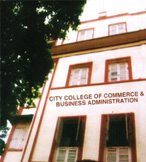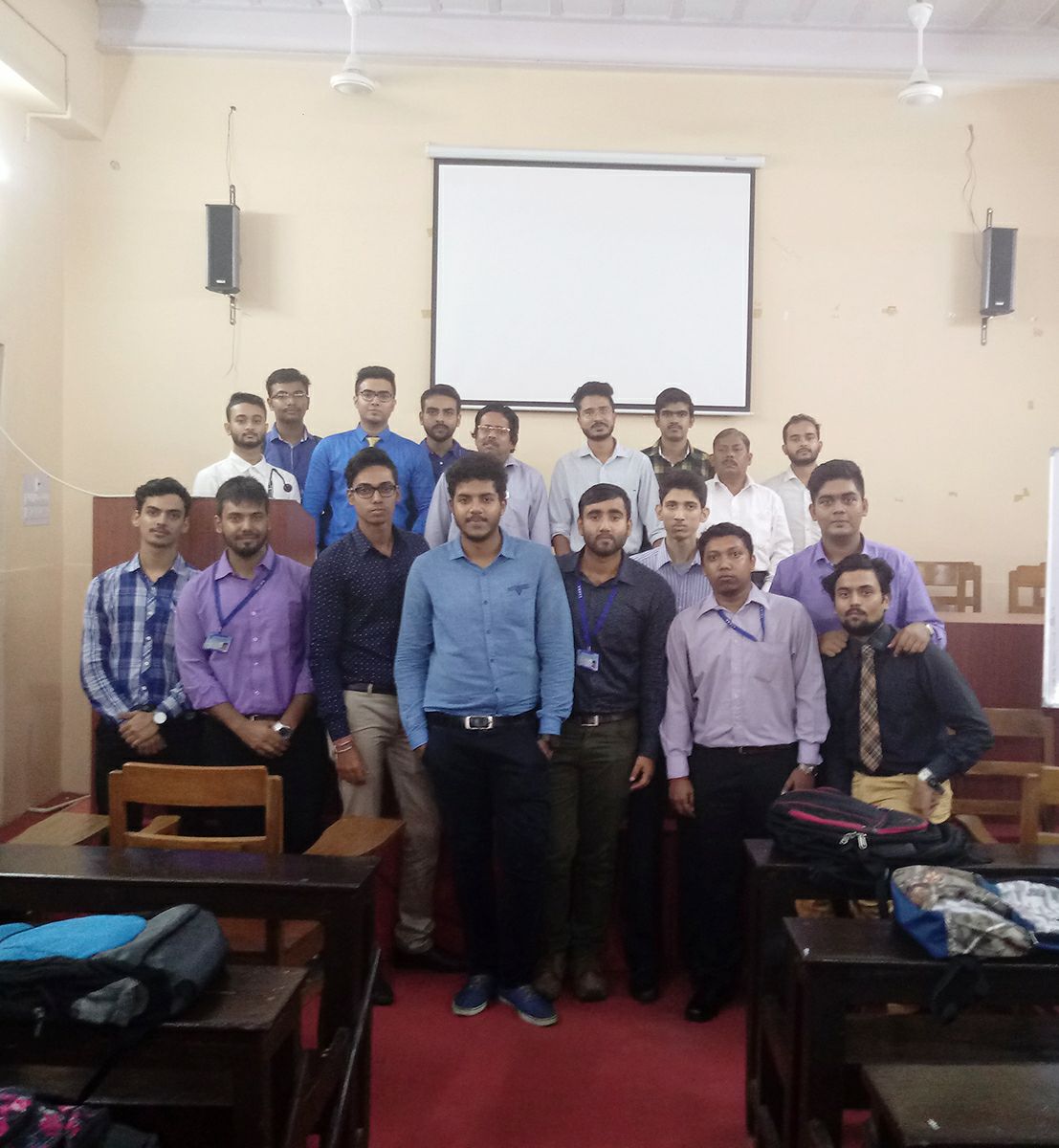The college being affiliated to the University of Calcutta, it follows the syllabus, norms and guidelines formulated by the university. The college being an institution catering exclusively to commerce and commerce-related subjects, it the courses taught are B.Com (Hons.) and B.Com (Gen) in Accounting and Finance. The Program Outcomes (PO) and Course Outcomes (CO) are adopted for all programs offered by the institution in accordance with University of Calcutta’ guidelineS -(SYLLABUS – UNIVERSITY OF CALCUTTA – CBCS CURRICULUM VIDE ORDER NO. CUS 294/CIR 17 DATED 14.09.2017).
SEMESTER –I:
1. Languages: Communicative English/Bengali/Hindi (AECC.1.Chg. & MIL)
Outcome:
- Development of a sense of reading an unseen text and comprehend its meaning
- Learning to take to-the-point decisions from a survey of similar-looking answers
- Development of an idea about career-building, competitive English papers
- Select literary passages included to generate interest in areas outside the subject of study
2. Microeconomics I & Statistics (GE1.1Chg)
Outcome:
Microeconomics:
- Gaining a basic knowledge about the chief concepts of microeconomics
- First-hand knowledge of market survey and of different kinds of marketStatistics:
Satistics:
- The basic use of statistics in the field of commerce
3. Business Laws (CC1.1Chg.)
Outcome:
- Familiarity with the basic structure and framework of Indian Business Law
- Familiarity with case law studies
- Knowledge imparted on negotiable instruments, dishonour of instruments and the solutions thereof.
4. Principles of Management (CC1.2 Chg.)
Outcome:
- First-hand acquaintance with the general principles of management
- Study of management theories and managerial responsibilities and functions
5. Financial Accounting (CC1.1Ch):
Outcome:
- Imparting knowledge of accounting concepts, theories and applications
- Familiarising students with the methods and accounting procedures
SEMESTER – II:
1. E-Commerce & Business Communication (GE2.Chg.):
Outcome:
- Introducing students to the basic principles of e-commerce and communication technology
- Inculcating theories of business communication and teaching techniques and modes of drafting
2. Company Law (CC2.1Chg.):
Outcome:
- Over-all acquaintance with laws related to business and commerce
- Acquaintance with Indian Contract Act, 1872 and Companies Act, 2013
- Familiarity with Labour Laws in India
3. Marketing Management & Human Resource Management (CC2.2Chg.):
Marketing Management
Outcome:
- An over-all survey of the marketing decisions
- Exploration of the marketing strategies linked to decision making in various scenarios
- Human Resource Management
Outcome:
- Inculcating in the students different aspects of human resource development
4. Cost & Management Accounting – I (CC2.1Ch)
Outcome:
Costing:
- Teaching students the concept of cost & the methods of cost accounting
- Educating the students about the value of cost in any production and the methods involved in enhancing profit
Semester III:
1. Information Technology & its Application in Business (SEC 3.1 Chg)
Outcome:
- A comprehensive understanding of information systems
- Familiarity with use of applications software
- Practical application of methods such as MS-PowerPoint, MS-Office, MS-Access and Tally
- Familiarity with the positive and negative points related to computer applications
2. Business Mathematics & Statistics (GE 3.1 Chg):
3. Financial Accounting II (CC 3.1Ch):
Outcome:
- Knowledge about the vertical preparation of Final Accounts
- Gaining knowledge about accounting and accounting practices and the basic differences between the two
- Helping students gain knowledge about different kinds of accounts and accounting practices
4. Indian Financial System (CC3.2 Ch):
Outcome:
? Acquisition of a complete understanding of different financial institutions
? Acquaintance with functions of banks and markets (Capital and Money markets)
? Study of matters relating to money and banking and non-banking financial transactions
Semester IV:
1. Microeconomics –II & Indian Economy (GE 4.1 Chg)
Outcome:
? Familiarity with the present status of Indian economy, its problems, challenges and ways to tackle them
? Inculcating in the students about major policy adopted by different ruling Governments
? Illumining the policy strategies vis-a-vis those adopted by other countries
2. Entrepreneurship Development & Business Ethics (CC 4.1 Chg.)
Outcome:
? Students educated to be self-reliant and enterprising
? Fostering the positive spirit of being self-employed
? Acquiring knowledge about business ethics and Corporate Governance, especially in the context of India
? Acquiring knowledge about Corporate Social Responsibility
3. Taxation (CC 4.1Ch)
Outcome:
? Gaining knowledge about Tax policies and procedures
? Imparting knowledge about Indirect Tax laws and Foreign Trade Policies (2015-20)
4. Cost & Management Accounting II (CC4.2Ch)
Outcome:
? Imparting knowledge about costing and cost accounts
? Gaining knowledge about methods of costing and their applicability
? Different methods taught to gain idea about managerial decision-making and the sources and uses of fund
Semester V
1. Auditing & Assurance (CC5.1 Ch)
Outcome:
? Studying different aspects of auditing by students helping them used them in different fields
? Gaining insight and knowledge to detect loopholes and manipulations in auditing procedures and suggest recommendations
? Practical knowledge helping application of the same in different perspectives to develop professional skill or expertise
2. Taxation – II (CC5.2Ch)
Outcome:
? Acquiring legal knowledge about Income Tax provisions as well as amendments
? Gaining expertise in the computation of income and tax liabilities of individuals and firms
? Gaining knowledge in the filing of Income Tax return and related issues
3. Macroeconomics & Advanced Business Mathematics (DSE 5.1A)
Outcome:
? Imparting information and knowledge of the theory of monopoly and everything related to that
? Price discrimination
4. Corporate Accounting (DSE 5.2A)
Outcome:
? Imparting knowledge about computation of shares and debentures of companies
? Learning about preparation of final accounts
? Knowledge gained about accounting treatments in various fields
Semester VI
1. Environmental Studies (AECC 6.1 Chg.)
Outcome:
? Imparting knowledge about natural and national resources
? A thorough knowledge about ecosystems and conservation of natural resources and their relation to life and society
? Facilitating field study
2. Computerised Accounting System & E-filling of Tax Return (SEC 6.1 Chg.)
Outcome:
? Imparting knowledge about the use of Tally and application of TDS and GST in Tally
? Imparting knowledge about filing of Income Tax return and submission of tax documents
? Developing ability to differentiate among different kinds if Income Tax returns
? Gaining knowledge about TDS and TDS returns
3. Project Work (CC6. 1Ch)
Outcome:
? Acquiring practical knowledge about the programmes learnt through the pursuance of the curriculum
? Imparting knowledge about Project Management
? Helping students gain knowledge about schemes and planning of projects
? Gaining knowledge about organising facts and data for solution of problems
? Learning techniques about research methodologies and application of the same in different fields of study
? Application of the basic methods of financial statement analysis
? Imparting knowledge about the role of accounting numbers in the valuation of entities
? Imparting knowledge about how to make a written analysis of a listed company
? Learning how to conduct and pursue business research
? Learning how to work in a team environment
4. Financial Management (DSE 6.2.A)
Outcome:
? Imparting knowledge about the basic concepts and methods of financial management
? Making students gain knowledge about the role of financial management for business concerns
? Inculcating in the students knowledge about Capital budgeting, Working capital knowledge about business finance
? Exploration of financial management from the corporate perspective
? Understanding the concept of corporate financial management
5. Financial Management - I (DSE6.2AG)
Outcome:
? Studying the basic accounting principles
? Exploration of the framework of financial accounting and its application in the contemporary business environment
? Developing the ability to study and review the financial situation and dealings of
particular organisations
? Studying and methodically recording financial transactions


